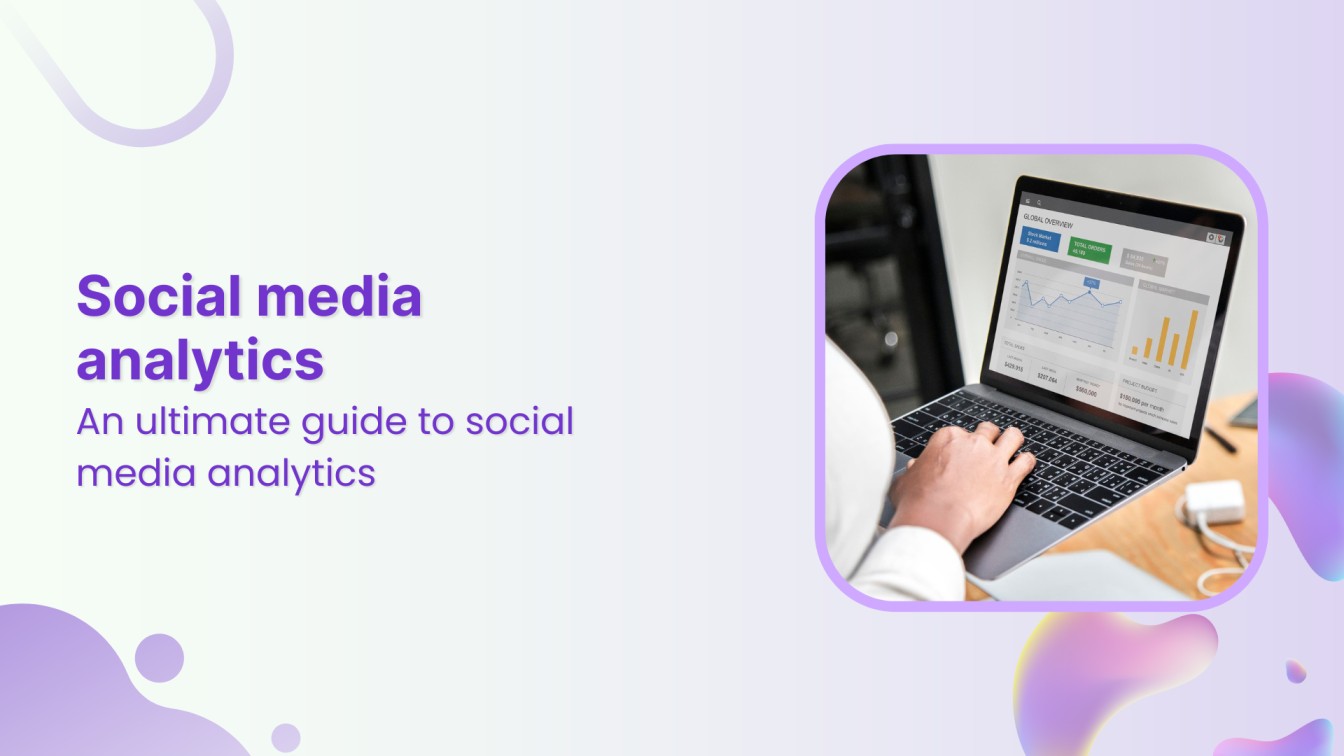Exciting news! Contentpen is live -Join todayand grab 50% off on annual plan. Limited slots only 🎊
10 Social media dashboard examples for better management
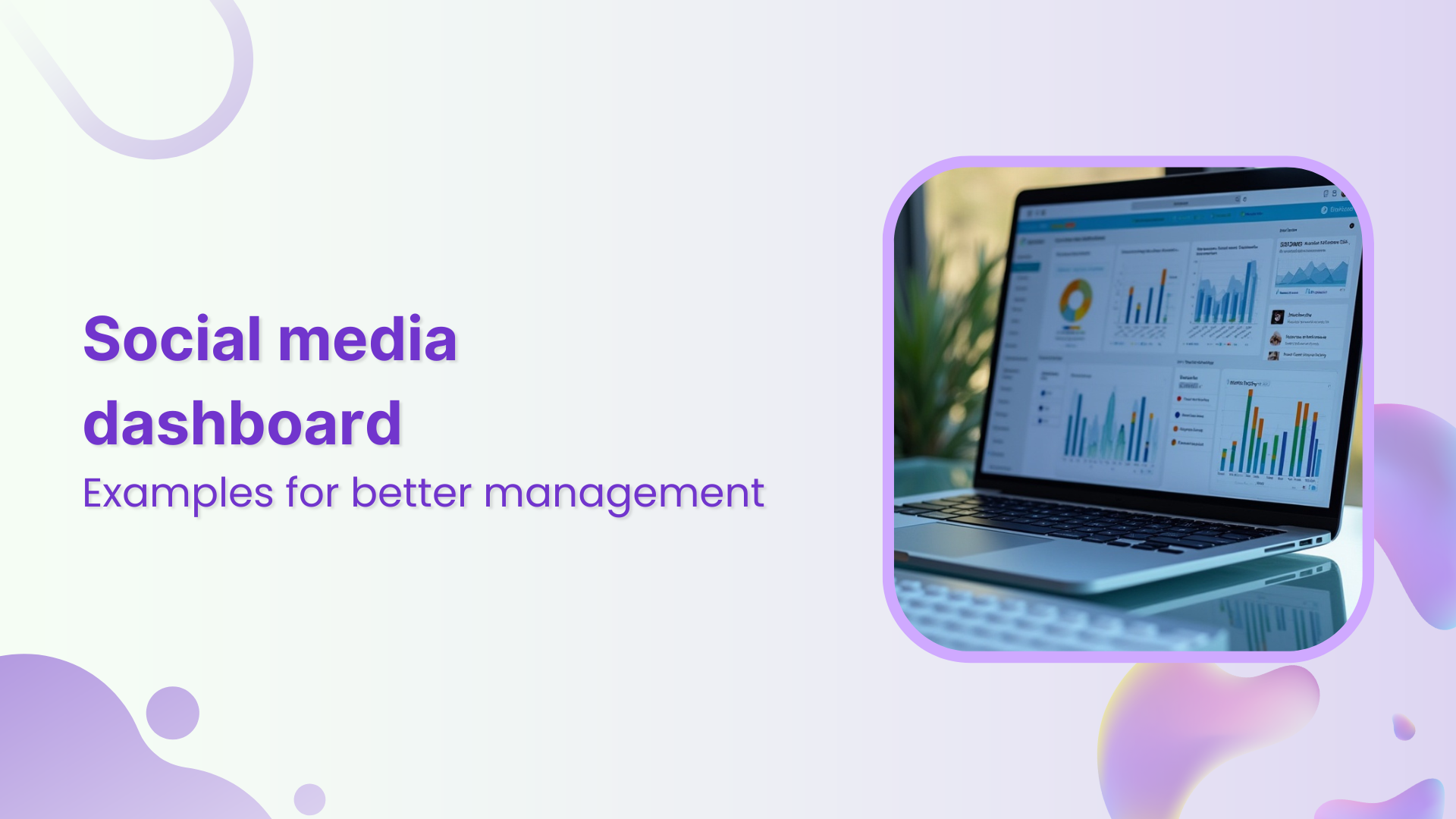
Social media isn’t as hard to unravel as most people think. It’s often said that consistency is the key to success on social media. Well, consistency is only half the equation, the other half is how much you enjoy the social media content creation process.
Some basic ingredients to the social media success recipe include a passion for the niche, taking care of the community, showing up consistently, and delivering valuable content throughout.
It’s almost impossible to pull this off without a comprehensive social media dashboard tool.
Let’s explore a social media dashboard, its features, and how to choose the best one for your social media marketing.
Simplified social media marketing for individuals & agencies.
Try ContentStudio for FREE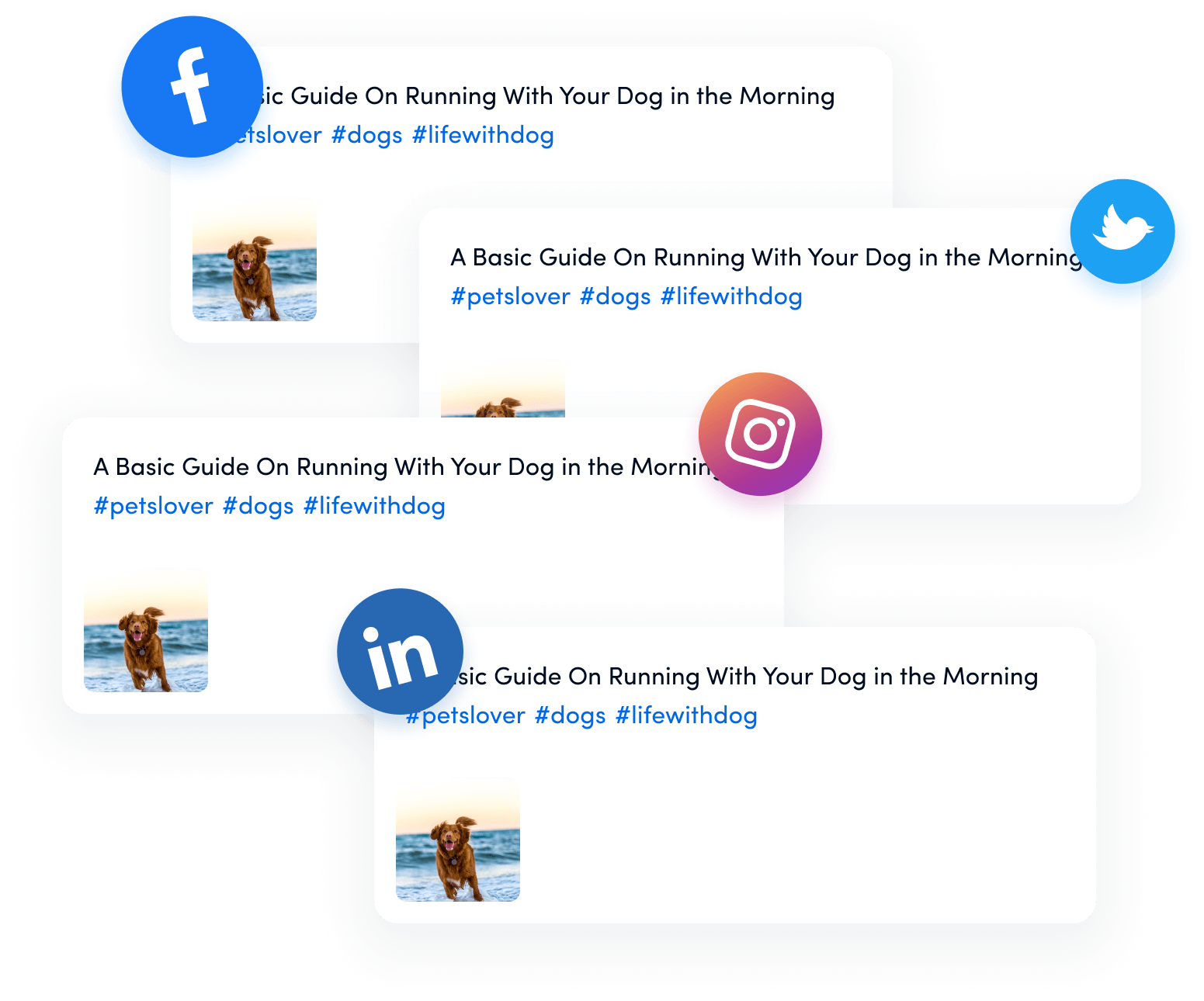
What is a social media dashboard?
A social media dashboard is a centralized tool that consolidates various social performance metrics and presents them in an organized form when required. A major role of a social media dashboard is publishing, managing, and analyzing social media content across different social media platforms.
A social media management dashboard keeps an eye on the social media content performance and ensures the smooth implementation of the social media marketing strategy.
Here’s an example of a social media dashboard:
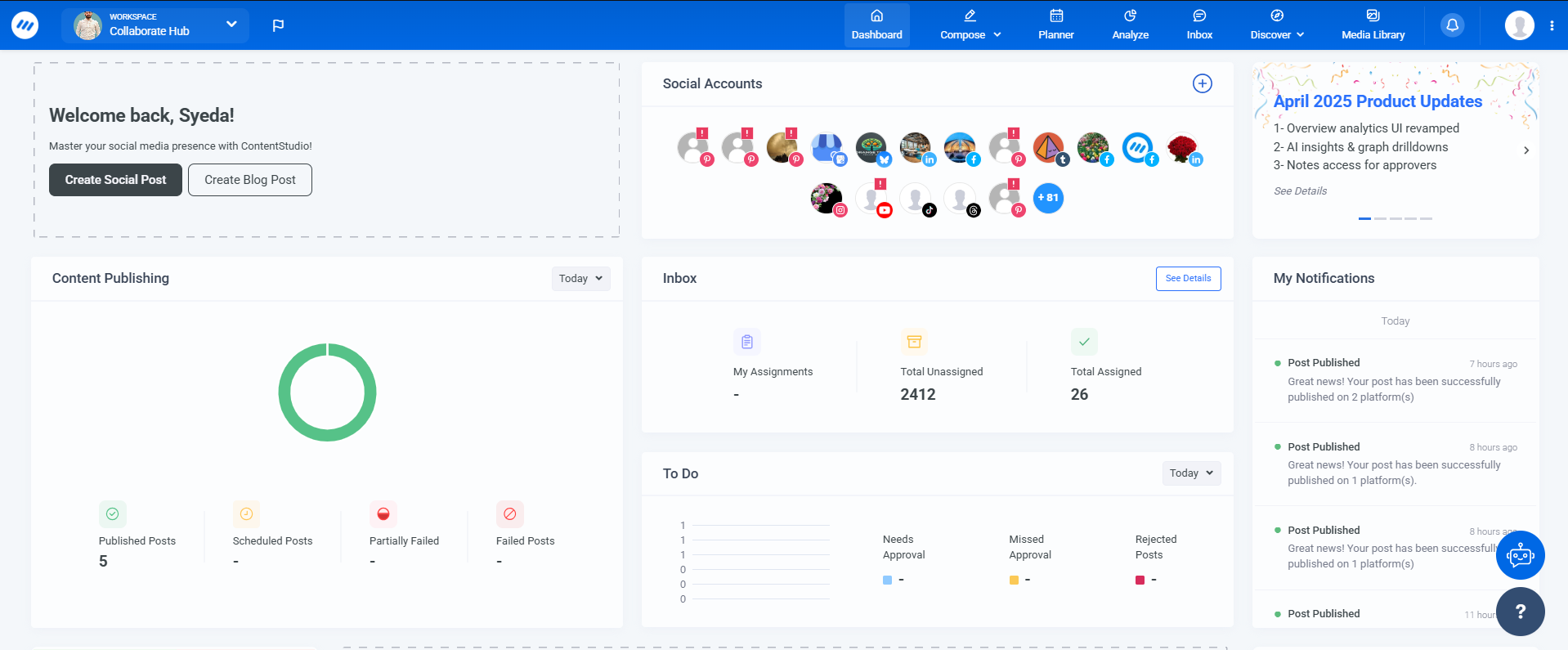
The screenshot is taken from ContentStudio’s dashboard—this is how the dashboard looks to the ContentStudio users.
Social media marketing isn’t about creating social media posts and publishing them across multiple social platforms without due diligence.
A strategic approach is required to run a successful social media marketing campaign; for instance, there are several aspects of running a social media marketing campaign, such as:
- Choosing the suitable social media platform for the brand
- The best time to post on each social media platform
- Identifying what type of topics/trends are getting more traction
- Experimenting with multiple content types, such as articles, videos, images, etc.
- Analyzing social media content performance to find winning posts
The job of a powerful social media dashboard is to ensure that the brand or individual finds most of these elements of running an effective social media marketing campaign under the same umbrella.
Must-have features of a social media dashboard
The top-tier social media management dashboard tools offer dozens of features that make social media management easier than ever.
However, there are some essential tools that every social media dashboard must have to be able to fully equip the users. Let’s take a look at some of the must-have features of a social media tool:
1. Workspaces for managing multiple brands or clients
A workspaces is a powerful feature available in ContentStudio used for managing multiple clients or brands. It’s an extremely useful feature of the social media dashboard for marketing agencies and social media managers that handle multiple social media clients.

It ensures that all social media profiles, campaigns, and reports are organized by brand or client, avoiding mix-ups and improving workflow efficiency.
Moreover, switching between profiles only takes half a second – users don’t have to create multiple social media dashboard accounts to manage social media for multiple clients.
2. Content calendar for planning and overviewing
An efficient content calendar provides a visual representation of all published and scheduled posts across various social media platforms. It helps users overview and plan content publishing, ensuring a steady and consistent flow of social media posts. More importantly, it gives an inside-out report about the published and scheduled content.
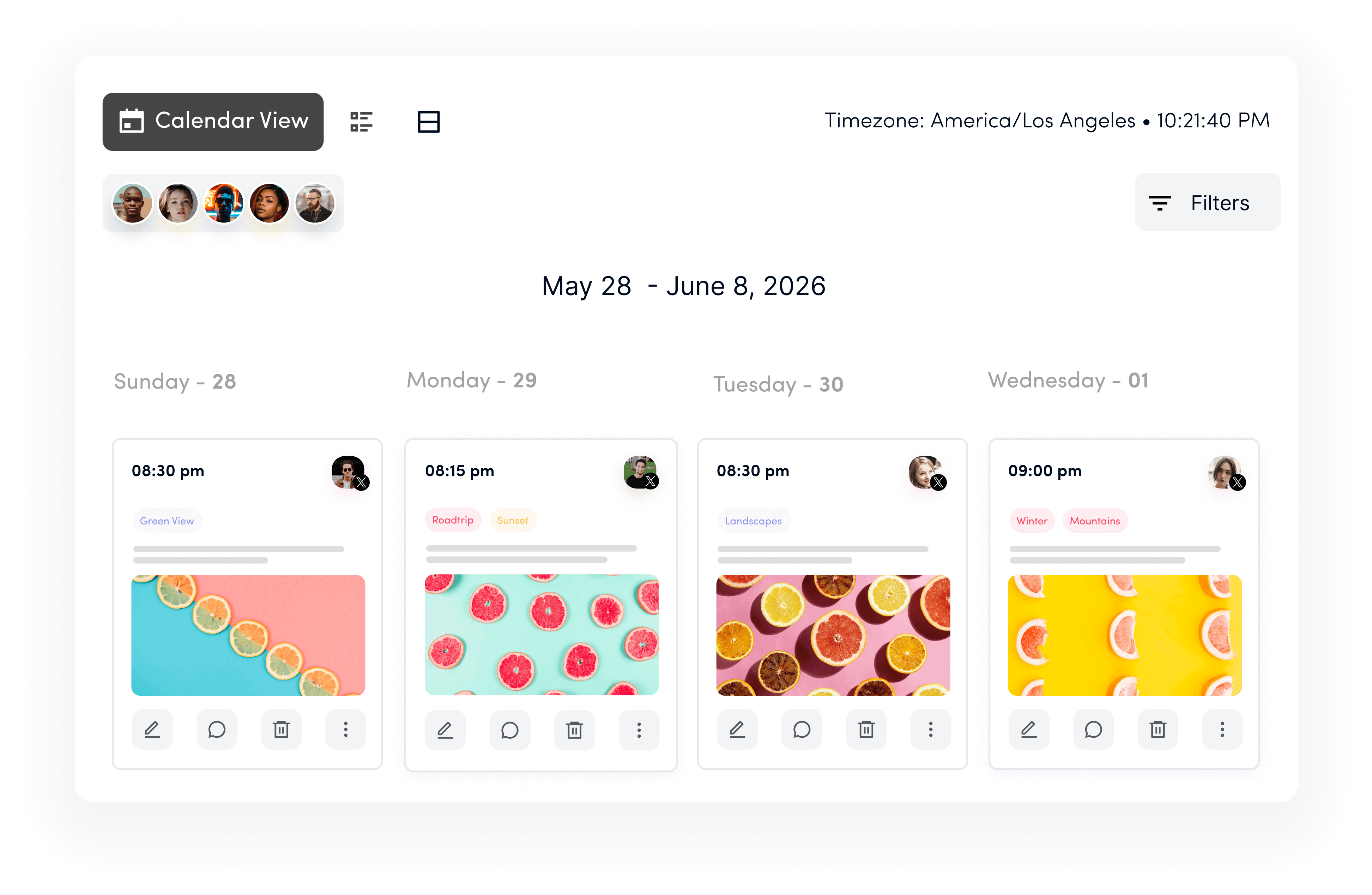
Some of the social media management dashboards allow users to easily reschedule and edit social media posts directly within the calendar, providing a bird’s-eye view of campaigns and social media content.
Social Media Content Calendar
Stay consistent and organized with Contentstudio’s social media content calendar for marketers and agencies.
Get Started for FREE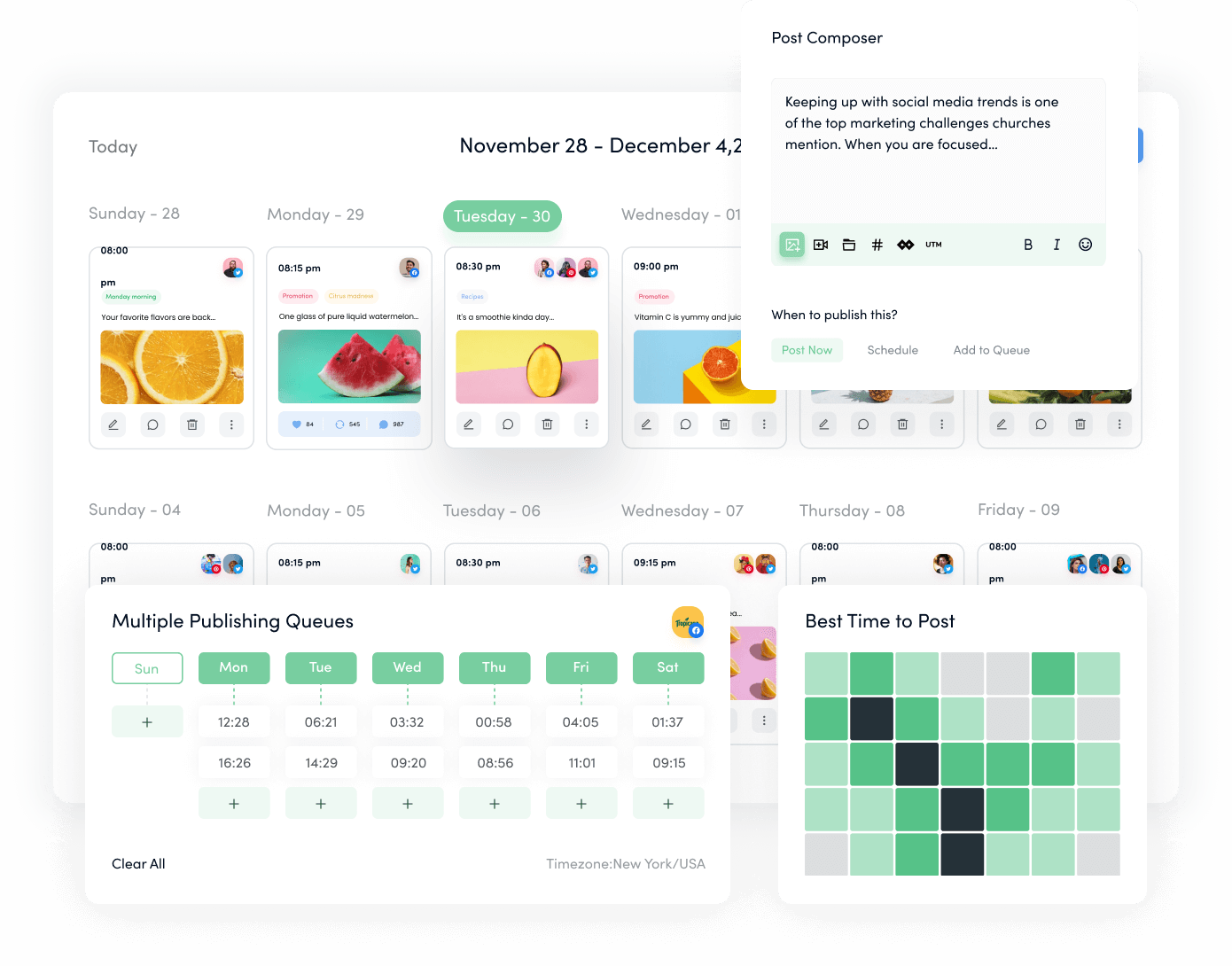
3. Social media publishing across all major social platforms
It’d be criminal negligence if a social media dashboard didn’t have a social media post scheduling feature. Most social media management tools have a unified publishing system, allowing them to publish and schedule social media content across major social media platforms.
For instance, ContentStudio allows users to post and schedule content on Facebook, Instagram, LinkedIn, Pinterest, Twitter, YouTube, TikTok, and Threads.
The best part about such features is that they eliminate the need to log in and out of multiple accounts or apps every time you post or schedule content. Plus, everything a user needs to run a social media campaign is built into this dashboard.
4. Social media analytics for monitoring content performance
An advanced analytics section offers detailed insights into content performance, which is integral to any social media marketing campaign. It provides in-depth reporting on several key metrics, such as engagement rates, impressions, clicks, and follower growth.

Furthermore, these insights help social media managers, influencers, and experts measure the success of their social media marketing campaigns. Moreover, an effective analytics section of a social media dashboard allows users to identify top-performing posts to replicate the idea or create similar content for more attention.
5. AI assistant for making content creation faster and more efficient
An AI-powered assistant can significantly speed up the content creation process. It helps generate post ideas, optimize headlines, write AI captions for engagement, suggest hashtags, and even recommend the best times to post based on audience activity.

It sure is a must-have feature in social media management tools, especially when AI writing and graphics tools are taking over the internet. A built-in AI toolkit in a social media dashboard could turn things around for marketers and agencies.
6. Competitor analytics tool for spying on competitors
Competitor analysis tool is an integral feature of any social media management dashboard. It offers valuable insights by tracking competitor content, engagement, follower growth, and overall social media strategy.

The best part about this feature is that It helps users understand what works for their competitors and what doesn’t, allowing them to tweak their strategies. The purpose of a competitor analysis tool is to identify gaps in the space and showcase opportunities to the users.
7. Flawless integration with third-party marketing tools
Third-party integration with marketing, analytics, and email automation tools takes any social media dashboard to the next level.
Seamless integration with third-party tools enables marketers to combine social media data with broader marketing data, creating a more comprehensive view of customer engagement across multiple channels.
These are some of the note-worthy features of a social media dashboard that help drive a social media marketing strategy to success.
5 social media management tool examples
Let’s take a look at five of the best social media management dashboard examples:
1. ContentStudio

ContentStudio is an excellent social media management tool for publishing, scheduling, managing, and analyzing social media content across multiple platforms. It’s a complete social media dashboard for running an effective social media marketing campaign.
It offers a user-friendly interface loaded with top-notch social media management features. No wonder it serves over 70,000 satisfied users around the globe.
Most of the customers are small businesses, e-commerce and fashion brands, digital marketing agencies, influencers, and bloggers who want an easy-to-use, affordable, and AI-powered social media management tool.
Features
- Social media content publishing and scheduling
- Blog publishing feature that supports several blogging platforms
- Social media content calendar to overview social content plan
- AI assistant for writing social media and blog content
- Social media team collaboration for effective connectivity
- Workflow approval system for overseeing content publication
- Social media analytics for monitoring content performance
- Seamless integration with several marketing and email automation tools
- Access to numerous free generators and convertors
Pricing plans
- Starter plan starts at $25 per month
- Pro plan starts at $49 per month
- Agency plan starts at $99 per month
Free trial
A 14-day free trial is available
2. Planable
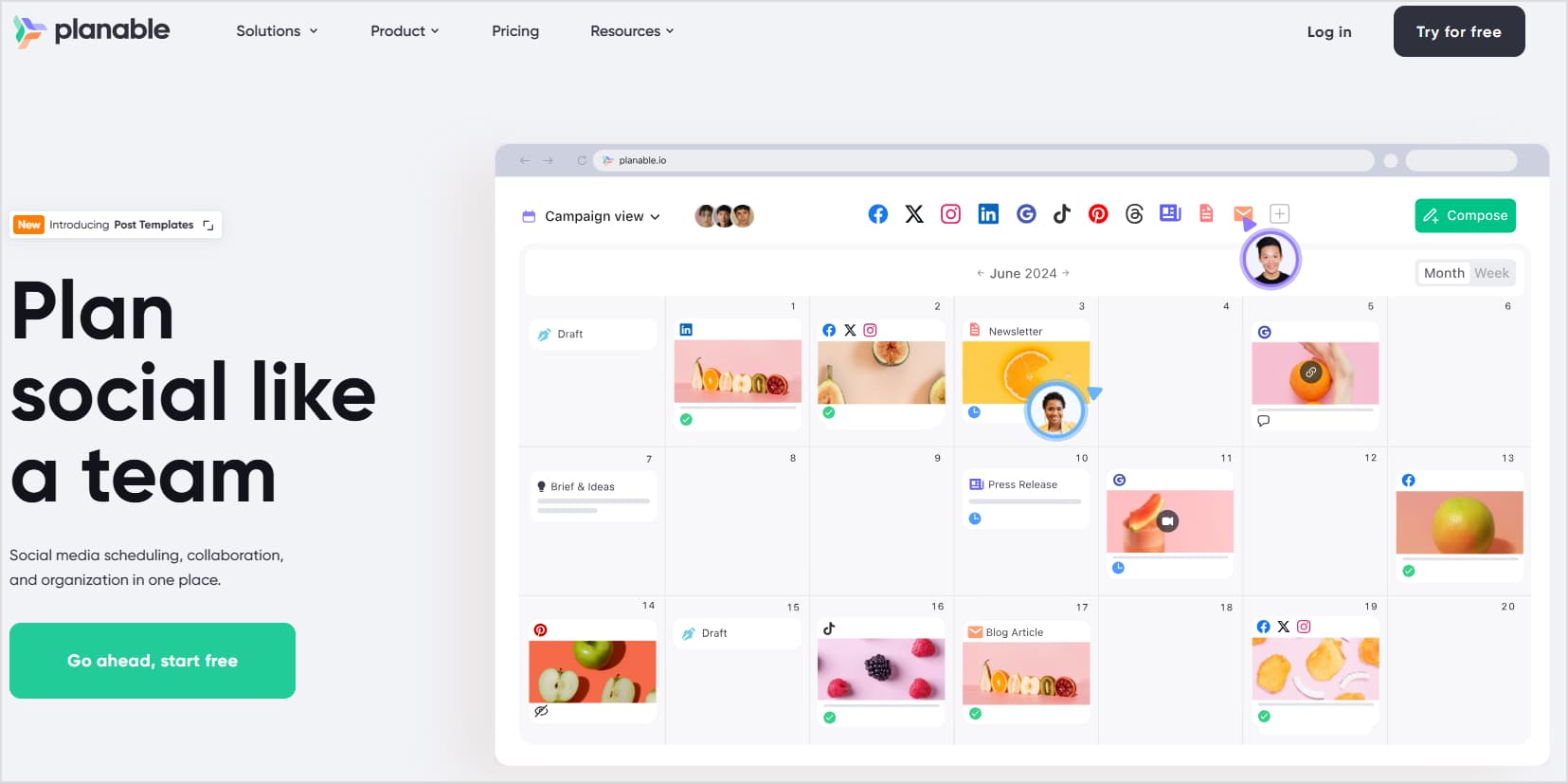
Planable is yet another fantastic social media management dashboard for marketers, brands, and social media influencers. An effective social media marketing campaign requires an efficient tool to plan, schedule, collaborate, approve, and publish social media content across multiple platforms, such as Facebook, Instagram, Twitter, and LinkedIn.
It offers social media content publishing, scheduling, approving, and analyzing under the same umbrella. This social media management dashboard works for both individuals and small teams.
Features
- Easily post or schedule social media posts and blog posts with the composer.
- Use AI assistance to write post captions
- Utilize Calendar view to overview your publishing cycle
- Capitalize on approval workflows to keep an eye on social publishing
- Monitor social media post performance through analytics
Pricing plans
- The free plan costs $0 per month
- The basic plan starts at $33 per month
- Pro plan costs $49 per month
- The enterprise plan requires users to contact the team
Free trial
Planable offers a full-fledged free plan instead of a free trial.
3. Planoly
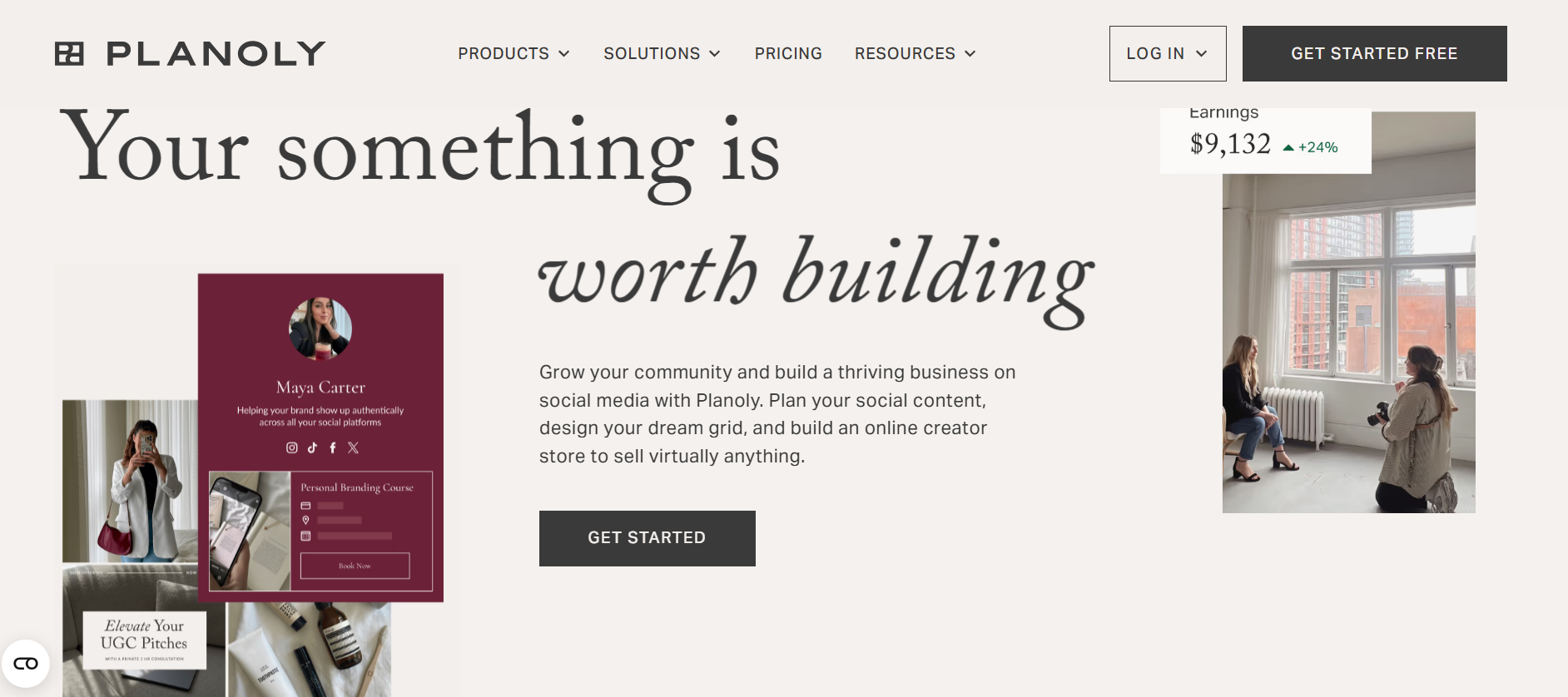
Planoly is a fantastic social media management tool for businesses, social media content creators, and influencers. It offers all the basic social media dashboard features that allow users to manage social media content publishing. Moreover, such features help marketers and brands in managing social media marketing with ease.
It supports all major social media paltforms, such as Facebook, LinkedIn, X (formerly Twitter), Pinterest, TikTok, Threads, and YouTube.
Features
- Post or schedule content on all mainstream social platforms
- AI caption writing tool makes social publishing faster and more efficient
- Hashtag manager lets users generate relevant hashtags with ease
- Auto-publishing and republishing assist users in churning out more content
- Storefront features create e-commerce opportunities for users
Pricing plans
- Starter plan starts at $16 per month
- Growth plan costs $28 per month
- Pro plan is priced at $43 per month
Free trial
A 7-day free trial is available
4. Socialbu
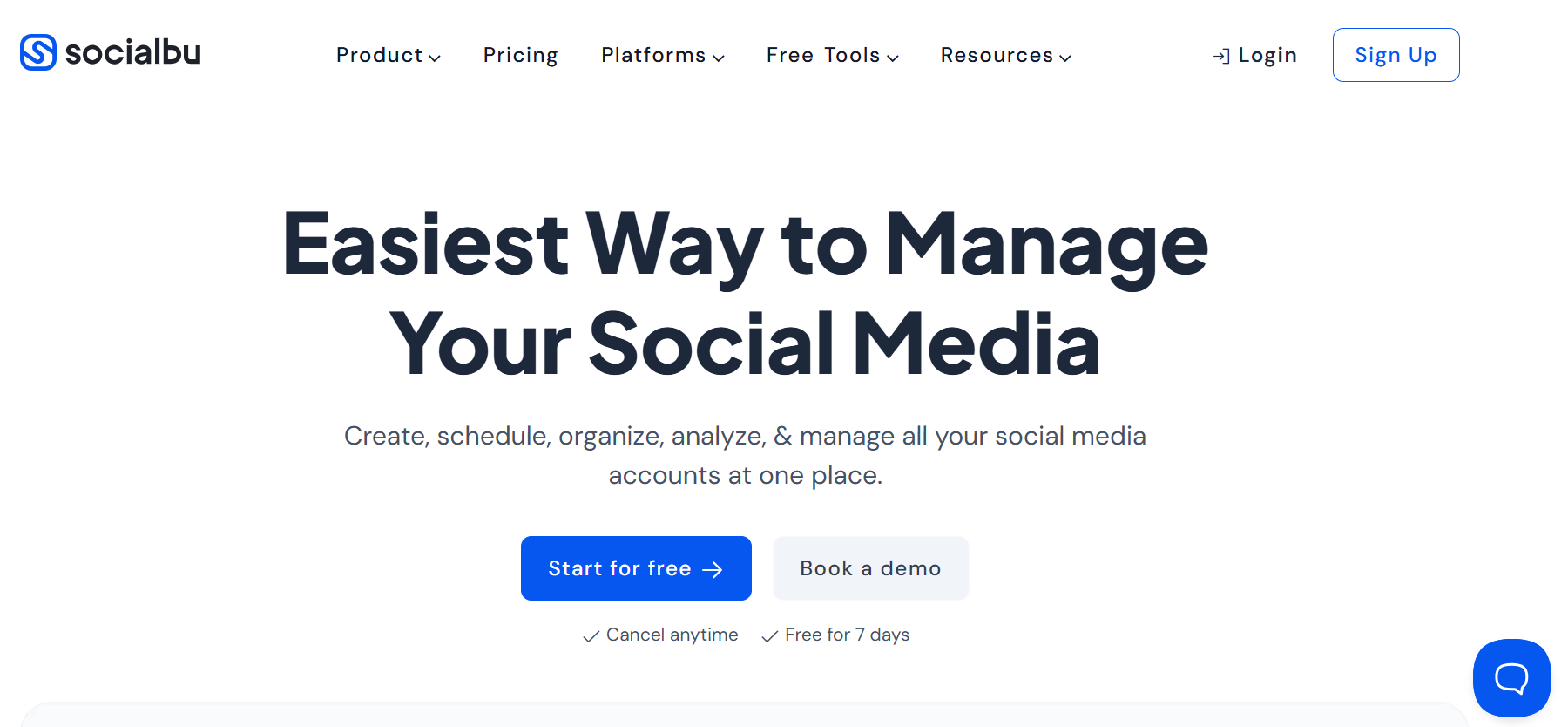
Socialbu is a powerful social media management dashboard for social media influencers, brands, and digital marketing agencies. It’s a complete social media toolkit for creating, scheduling, collaborating, discovering, and analyzing social media content across multiple platforms.
It’s equipped with all essential social media marketing and publishing tools for managing social media campaigns for brands and clients. Publish or schedule social media content on Facebook, X, LinkedIn, Instagram, Mastodon, YouTube, Reddit, Pinterest, and Bluesky.
Features
- Plan, post, and schedule blog and social media content
- Use AI tools to generate captions, images, and hashtags,
- Track hashtags and keyword trends
- Easily repurpose and auto-post content
- Analyze social media content performance
- Collaborate with team members for effective social media management
Pricing plans
- The free plan is completely free
- The standard plan is priced at $19 per month
- The super plan costs $59 per month
- Supreme plan costs $199 per month
Free trial
A 7-day free trial is available on paid plans
5. Later
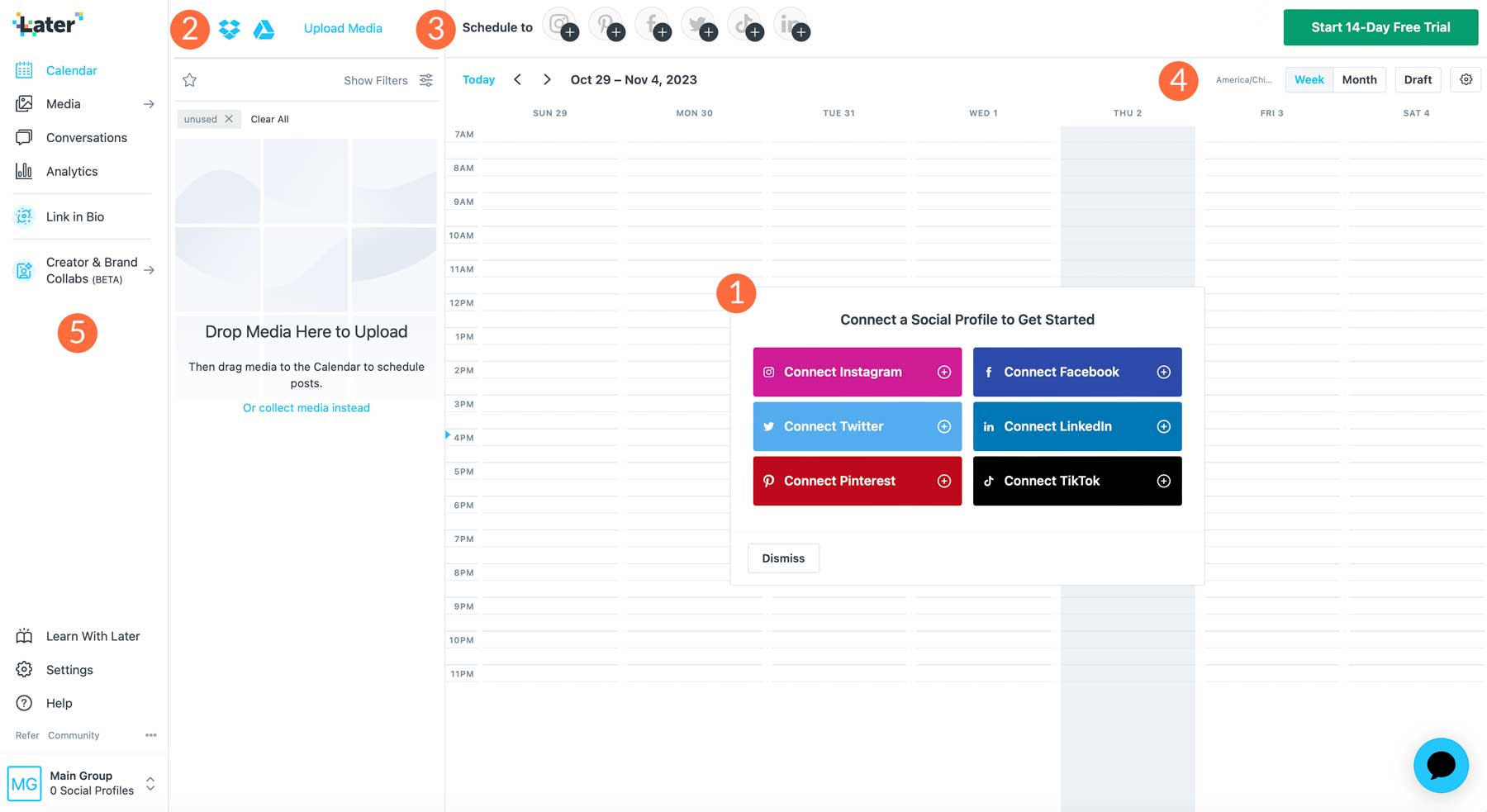
Later is a well-known social media dashboard for individuals, brands, and social media agencies. It allows marketers and brands to plan, schedule, and analyze their social media content.
Later offers all necessary social media management tools, which makes it one of the best social media dashboards. Moreover, this tool seamlessly integrates with several marketing softwares and tools.
Features
- Social media content scheduling and publishing across all social platforms
- Influencer discovery tool for hunting niche-related influencers
- Team collaboration to improve coherence between team members
- Analytics tool for monitoring and reporting social media content performance
- Auto publishing to improve publishing speed and efficiency
- Visual content planner for Instagram content management
Pricing plans
- Starter plan costs $25 per month
- Growth plan starts at $45 per month
- The advanced plan is priced at $80 per month
- The agency plan costs $200 per month
Free trial
Later offers a 14-day free trial on starter, growth, and advanced plans
5 social media management dashboard examples
We’d like to share some social media dashboard examples to give you some perspective on the idea of managing a social media management dashboard.
To do this, we’ll be using the ContentStudio tool to pull numerous analytics reports from different social media profiles, such as Facebook, Instagram, TikTok, etc. And showcase them as the social media dashboards.
Users can replicate the process and create their social media dashboard examples using the ContentStudio tool.
Here are the social media dashboards you might want to check them out:
1. Facebook dashboard
Facebook dashboard is a robust Facebook analytics area where users can see all sorts of performance and engagement metrics about their Facebook content.
The goal is to analyze all the Facebook KPIs in one place. There are some of the basic metrics to look out for when going through a Facebook dashboard, such as:
- Followers (gained)
- Impressions
- Post clicks
- Shares
- Comments
- Likes
ContentStudio provides access to detailed Facebook analytics for your page or group. To fully capitalize on your Facebook dashboard data, use a trustworthy social media management tool (like ContentStudio) to collect in-depth Facebook analytics for further improvements or actions.
2. YouTube dashboard
YouTube dashboard is the area where users can access detailed video performance reports, key performance indicators, video comparison data, subscriber trends, and similar metrics. Choosing the right YouTube dashboard tool can unleash new growth and attention opportunities for the YouTube channel.
Identifying the most important KPIs in YouTube analytics would set your channel apart from competitors and help in skyrocketing the channel’s growth. Here are some of the important KPIs to analyze in a YouTube dashboard:
- Video videos
- Subscribers (gained)
- Watch time
- Engagement
- CTR
- Likes
- Comments
ContentStudio allows marketers, influencers, and bloggers to dive deep into their YouTube channel’s analytics through the YouTube dashboard, which could turn things upside down for a YouTube channel.
3. TikTok dashboard
One of the social media dashboard examples is the TikTok dashboard. It gives TikTok users, whether they’re brands or individuals, a comprehensive TikTok analytics dashboard for discovering popular TikTok videos of the account and essential performance indicators that showcase TikTok content performance.
Take a look at some of the TikTok analytics KPIs when going through a TikTok dashboard:
- Followers (gained)
- Videos (published)
- Video views (earned)
- Shares
- Comments
- Engagement
ContentStudio ensures that the TikTok creators make the most of their TikTok dashboards. This tool offers top-performing posts, video views over time, engagement trends, and other vital TikTok account data.
4. Instagram dashboard
Instagram dashboard is a comprehensive data reporting platform for Instagram users to get insights into their Instagram content performance. An effective Instagram dashboard analyzes every type of Instagram content, such as posts, reels, stories, live streams, etc.
Here are the performance metrics to keep an eye on when going through the Instagram analytics on a dashboard:
- Followers
- Profile views
- Engagement
- Comments
- Likes
- Saved
- Reach
- Reactions
ContentStudio has an efficient Instagram dashboard that lets users analyze all of the above-mentioned KPIs. Moreover, it goes further and showcases Instagram audience growth, users’ publishing behaviors, top posts, users’ activity by hours and days, hashtag performance, and much more.
5. LinkedIn dashboard
LinkedIn dashboard is a crucial social media dashboard that highlights all the major KPIs of LinkedIn and showcases an inside-out report on LinkedIn’s content performance. There are a handful of KPIs to look out for when analyzing the LinkedIn dashboard:
- Profile viewers
- Post impressions
- Followers
- Search appearances
ContentStudio is a powerful social media management tool that seamlessly integrates with LinkedIn and provides a comprehensive LinkedIn dashboard for LinkedIn content performance and audience engagement analysis.
These are some of the best social media dashboards to keep a close eye on when creating or managing a social media marketing strategy.
How to set up a social media dashboard
It’s not rocket science to set up a social media dashboard. A social media dashboard is a social media management software of our choice that provides a complete toolkit to manage, operate, and analyze social media content marketing for brands and clients.
Since we’ve discussed several social media dashboard examples, it must have given you some perspective on what these social media dashboards are and how they work.
Here are the steps involved in setting up a social media dashboard for your company or personal brand:
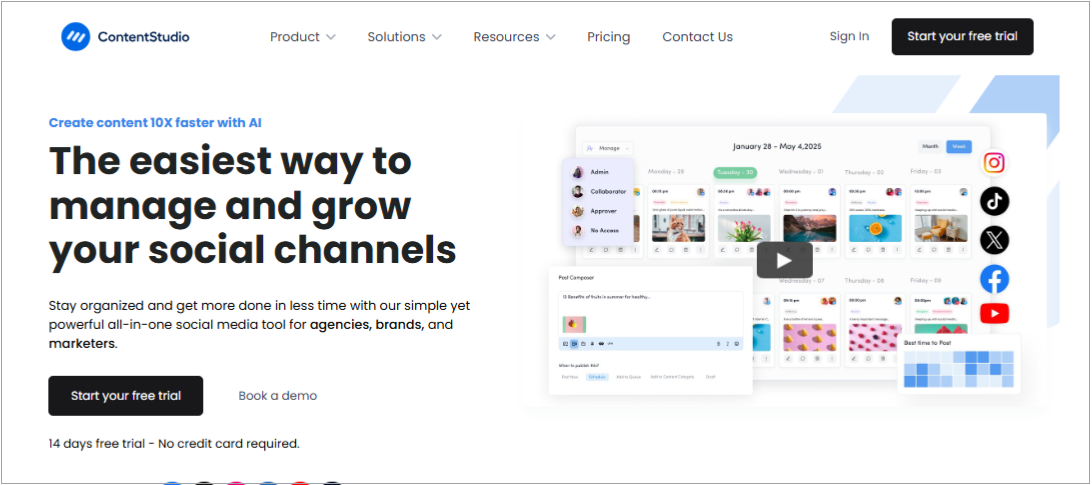
Step 01: Choose a recommended social media management tool
To set up a social media dashboard, start by choosing a highly recommended social media management tool for effective social media management.
This social media dashboard tool must be well-equipped to provide publishing, scheduling, managing, auto-publishing, short link management, AI assistance, and analytics under the same umbrella.
ContentStudio is a state-of-the-art social media marketing dashboard that for brands, marketers, and agencies. It’s a powerful social media management tool that offers various services, such as:
- Social content publishing/scheduling
- Blog content publishing/scheduling
- Influencer discovery
- Content calendar
- AI writing assistant
- Social inbox
- Branded short URL integration
- Social media analytics

It sure can be a great choice for brands, organizations, agencies, and influencers who are looking for a reliable, efficient, and cost-effective social media dashboard.
Start your 14-day free trial with no strings attached. Once you have successfully signed up, move on to step two.
Step 02: Connect the respective social media accounts
Connecting your social media account is crucial to using any social media dashboard whatsoever – ContentStudio is no different.
Once you have signed up and logged in to your ContentStudio account, head over to the top right corner and click on your profile icon to open the settings popup. Now, click on the Social Accounts button.
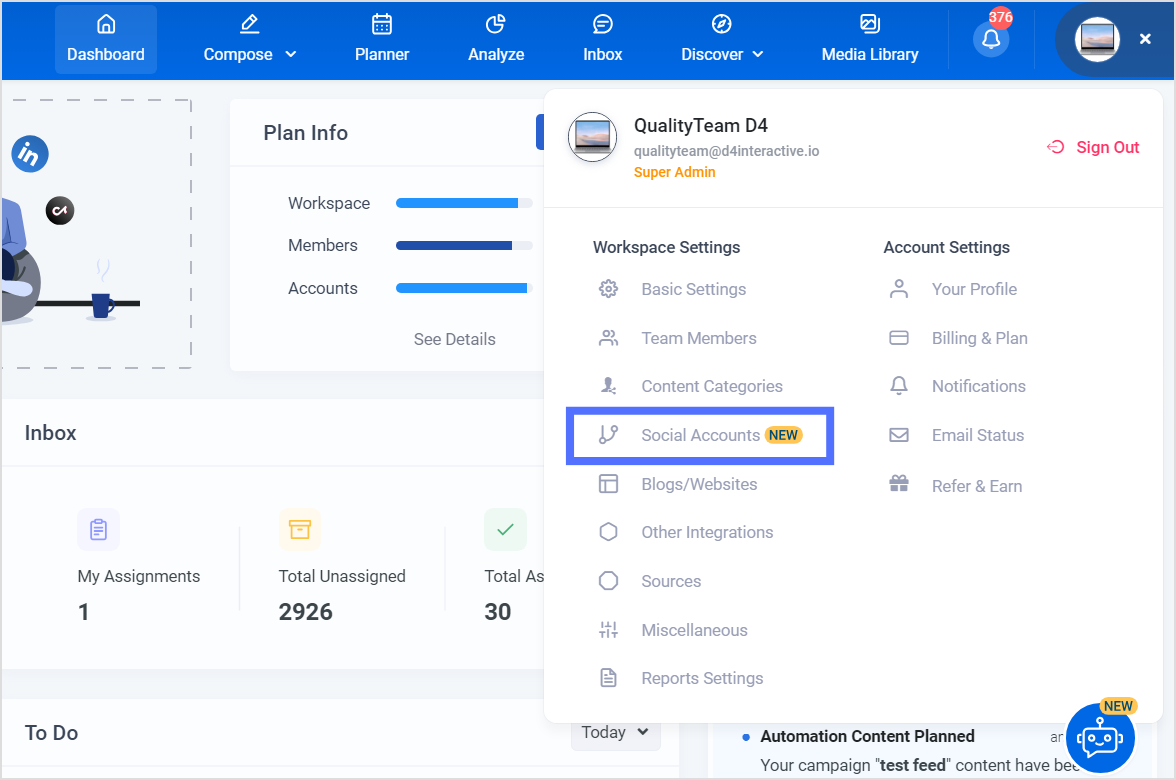
This is the area where you can integrate your social media accounts into ContentStudio. Go through each platform using the respective social media icons to the social accounts connectivity process.
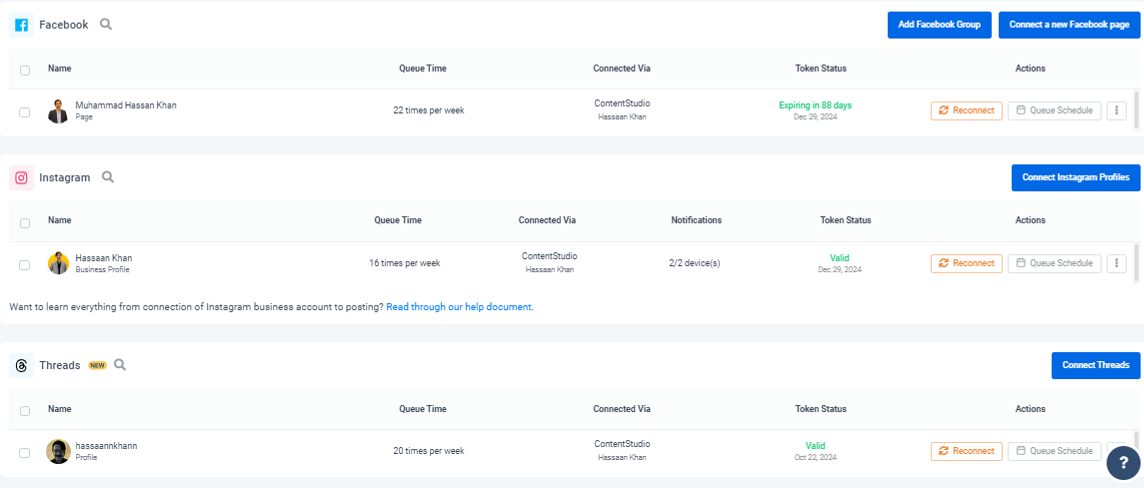
Once properly connected, your ContentStudio dashboard will be ready to post or schedule social media content across all connected platforms.
Step 03: Build your brand’s social media content strategy
After selecting the social media dashboard tool and connecting the social media profiles to the social media dashboard, it’s vital to pay attention to your brand’s social media content strategy. You might not want to post irrelevant and less effective social media content.
There isn’t any specific method to establish a strong social media content strategy. However, social media influencers and digital marketers utilize different tactics to come up with a social media content plan.
Here’s what they do:
- Check their previous top-performing content to collect ideas
- Look through comments and DMs to see what followers are struggling with
- Survey their audience via polls, email newsletter, or social posts
- Spy on their competitors to see what they’re working on
- Try to find content gaps in their niche to create content
- Follow the latest social media and content marketing trends to go with the flow
So, these are dozens of strategies that can be implemented to come up with a social media content plan that works for the brand.
Step 04: Start publishing/scheduling social content
The next up is the publishing and scheduling of social media content. To start on the right foot, utilize the social media content plan and begin the content creation process.
The social media content creation isn’t a one-off activity, but rather a continuous cycle until it requires major changes. Usually, social media departments create blog and social content in batches, so that have content in the pool throughout.
Once the social media content is ready, start publishing and scheduling the content. To make things easier, always use a popular social media scheduling tool.
ContentStudio has an advanced social media and blog scheduling features that ensure the content gets published on the respective platforms timely and efficiently.
It also analyzes social post performance and recommends the best time to post on each platform.
To publish or schedule social media posts, go to the Compose option and select the Social Post from the drop-down menu.
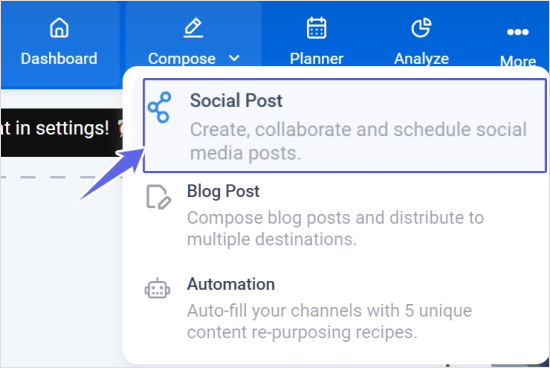
The Post Composer would appear. Select the social media platforms (from the left side) where you want to publish or schedule the content and prepare your social media post.
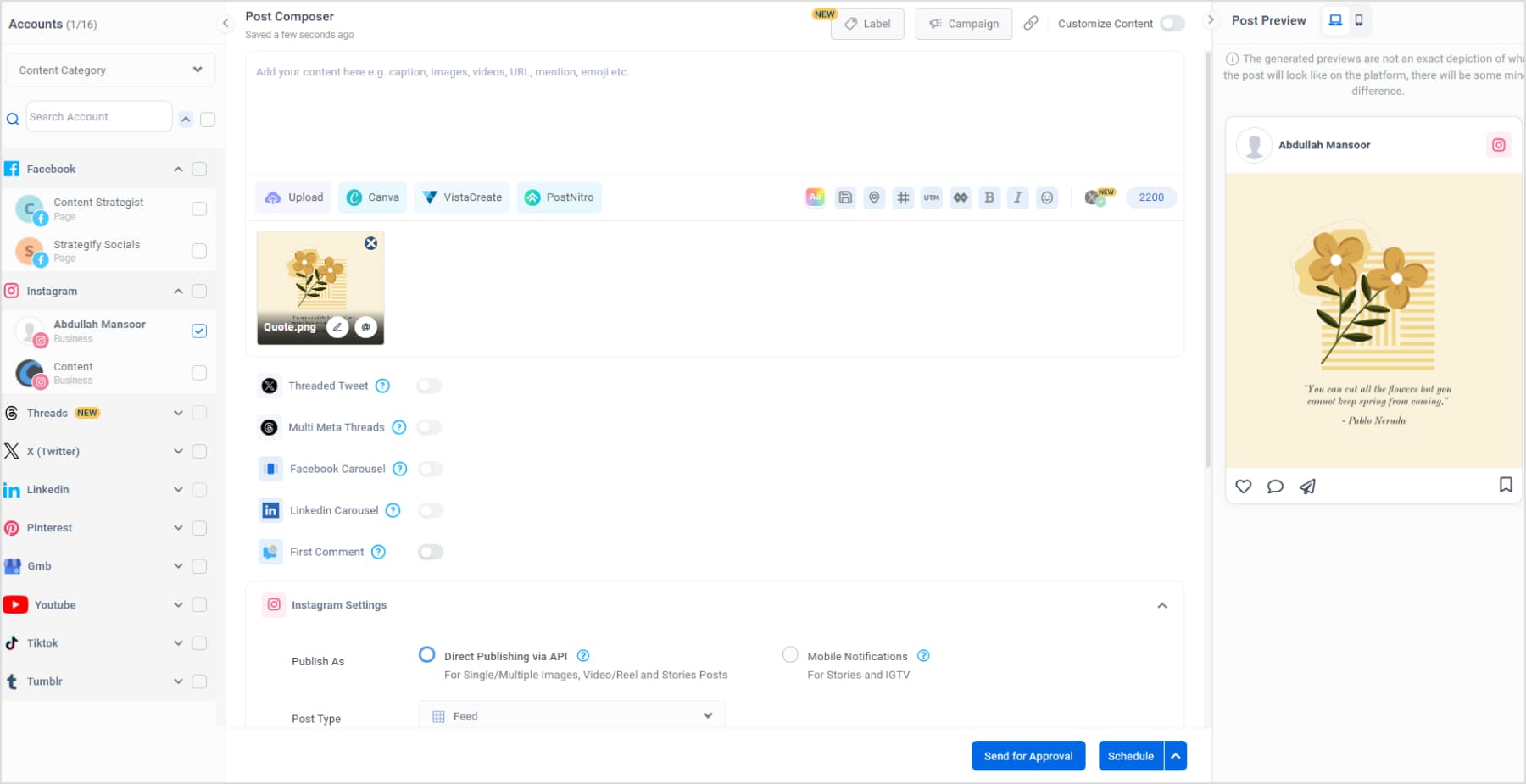
Once the posts are ready, go ahead and hit publish or schedule to proceed.
Step 05: Manage social media publishing using the content calendar
Overseeing your social media publishing calendar is crucial to managing an efficient social media marketing campaign. It’s a must-have tool in a social media dashboard.
Content calendar is a tool that helps users overview the publishing cycle and scheduled content. It gives an inside-out report on what pieces of content have been published and which ones are scheduled for the near future.

ContentStudio has a vibrant content calendar feature called Planner. It reports the status of the social media posts and classifies the posts according to their current status, such as in progress, draft, published, scheduled, failed, partially failed, in review, rejected, missed review, etc.

It provides an overview of the social media publishing cycle and offers several filters for reviewing the content calendar.
Step 06: Monitor social media content performance
The Analytics section is one of the most important features of a social media dashboard. It’s nearly impossible to navigate a social media strategy successfully without monitoring social media analytics. Use the analytics section of your social media dashboard to assess the situation and make publishing decisions.
ContentStudio has a robust social media analytics feature called Analyze. It lets users analyze social media content performance without any hassle.
To access the Analytics section, click the Analyze button from the top menu bar.

This is where you see the social media analytics of your social media accounts linked to your ContentStudio dashboard. Select the social media channels from the left sidebar and dive deep into the specific social media platform’s analytics.
Moreover, the Analyze section has several other features, such as Competitor Analytics, Performance Analytics, and Manage Reports.
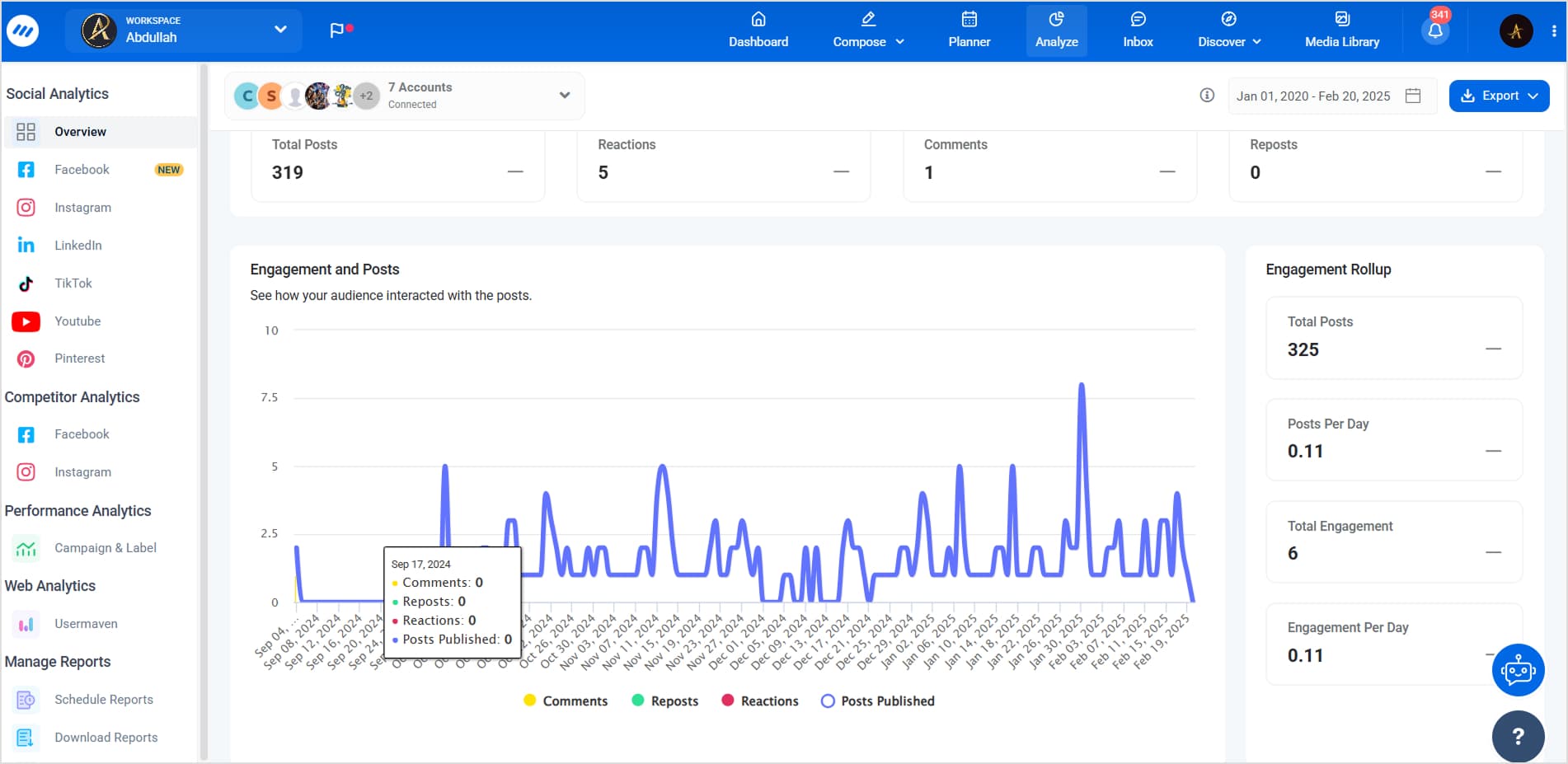
So, that’s how you can set up a social media dashboard for social media management.
Key takeaways
Before we conclude this social media dashboard examples topic, let’s shed some light on the essential takeaways that might reshape your content creation approach and rejuvenate your social media campaign:
- The choice of your social media management tools determines how effective your tactics would be, whether it’s a social media scheduler or social media image designer. Always try to choose the top-notch tools available at your disposal.
- One can’t just plan how to put out a massive amount of content across different social media platforms. Instead, they have to believe in what they’re putting out there. It takes the social media campaign to the next level.
- A powerful social media management allows you to sense the tone of the audience through analytics and engagement metrics.
- It’s super important to understand that social media is a two-way street. It’s as important to engage with the audience as it is to publish a piece of content regardless of the platform.
- A reliable social media dashboard ensures that team members effectively collaborate on the social media project and play the given role efficiently.
That’s it.
FAQs about social media dashboard
Let’s answer commonly asked questions about social media dashboards:
How to build a social media dashboard?
A social media dashboard is a multi-functional social media management tool that helps manage social media publishing and provides consolidated data reporting on social media publishing.
A powerful social media management tool is required to build an effective social media dashboard that seamlessly connects with all major social media profiles and reports performance metrics back to the dashboard.
How do I monitor social media content?
Every major social media management tool offers analytics features to analyze content performance. Monitor social media content publishing, scheduling, and engagement through that social media management tool.
What is the engagement rate on a dashboard?
The engagement rate refers to the percentage of the people engaged with the post. To calculate the engagement rate on social media, divide the total impressions by total clicks – you’ll get the engagement rate.

